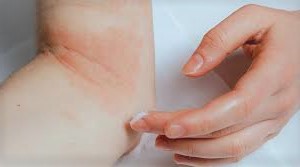eczema or atopic dermatitis is the condition of the skin where you face rough, itchy, and cracked patches. so today we are discussing dealing with eczema naturally in winter.
In this situation sometimes you recover with care like moisturizing, daily bath with normal water wearing comfortable clothes, etc. Most of the time you cannot recover without a doctor.
Dealing with eczema naturally in winter
Moisturize, moisturize, moisturize:
Proper hydration is essential for maintaining healthy skin, particularly in the winter season. Opt for a thick, fragrance-free moisturizer that is designed specifically for dry or sensitive skin. Apply it generously all over your body, paying extra attention to areas that are prone to dryness.
This moisturizer forms a protective barrier that locks in moisture and alleviates dry, itchy skin. Incorporate moisturizing into your daily skincare regimen, both morning and night, to ensure your skin stays nourished and supple. Always remember that optimal hydration is the cornerstone of healthy, radiant skin.
Avoid hot showers:
It may surprise you, but hot showers can strip away the natural oils that keep your skin moisturized and healthy, leaving it dry. Especially during the winter months, it’s important to be mindful of the temperature of your shower water.
Instead of using hot water, opt for lukewarm water which helps to retain your skin’s moisture and prevents further drying. By turning down the heat, you can enjoy a soothing and skin-friendly shower that won’t harm your skin.
Choose gentle, non-irritating cleansers:
When dealing with eczema, it is important to use gentle and non-irritating cleansers. Look for mild and fragrance-free cleansers that won’t aggravate your skin. Harsh soaps and fragrant cleansers can strip away the skin’s natural oils and worsen eczema symptoms. Opt for gentle cleansers that are specifically formulated for sensitive or dry skin.
These cleansers will help to cleanse your skin without causing further irritation or dryness. Remember that keeping your skin clean with the right products is a crucial step in managing eczema and maintaining healthy skin.
Dress in layers:
Dressing in layers is a smart strategy that can help you regulate your body temperature and prevent excessive sweating. By wearing layers, you can easily adjust your outfit according to the changing temperatures throughout the day. To get started, wear a lightweight, moisture-wicking base layer which will help keep you dry.
Next, add a middle layer for insulation such as a cozy sweater or fleece. Finally, top it off with a breathable outer layer to protect you from the elements. By following this method, you can stay comfortable and avoid overheating or getting too cold. So, stay cozy and stylish with layered outfits.
Use natural fabrics:
When selecting your clothing, it’s wise to choose natural fabrics such as cotton. This breathable fabric permits air to circulate, which reduces irritation and keeps your skin comfortable. It’s gentle on the skin and absorbs moisture, which keeps you dry and cool.
Natural materials such as cotton are also gentler and less likely to cause irritation or allergic reactions. So, choose the comfort and breathability of cotton to keep your skin happy and free of irritation. Stay stylish and comfortable in natural fabrics.
Humidify your environment:
If you’re experiencing dryness during the winter months, using a humidifier could be a great solution. By increasing the humidity levels in your environment, humidifiers can help alleviate dry skin, dry throat, and dry nasal passages.
This, in turn, can help you maintain optimal skin hydration and overall comfort. However, it’s important to keep your humidifier clean and well-maintained to prevent the growth of bacteria or mold. So, embrace the benefits of a humidifier and enjoy a more comfortable and moisturized living space.
Identify and avoid triggers:
To effectively manage eczema flare-ups, it’s important to identify and steer clear of triggers. Be vigilant in observing what factors or substances may be causing your eczema symptoms, such as certain fabrics, harsh detergents, or allergens.
Once you’ve determined these triggers, please make an effort to avoid them. For instance, choose hypoallergenic laundry detergents, opt for soft and breathable fabrics such as cotton, and limit exposure to known allergens. By taking a proactive approach and avoiding triggers, you can help prevent flare-ups and maintain the comfort of your skin. So stay aware and take good care of your skin.
we discussed dealing with eczema naturally in winter I hope you like this if you want to more about this topic; link 1
another one is;link 2
